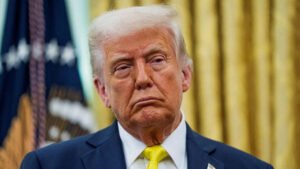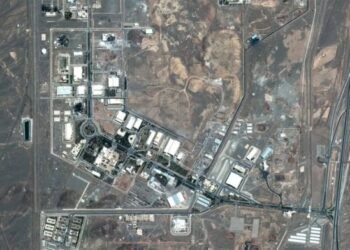Amid rising tensions, Iran’s top nuclear official confirmed preparations to restart uranium enrichment, sparking fears of a return to unchecked atomic development in the Middle East.
BY PC Bureau
June 24, 2025 – In a move set to heighten global anxieties, Iran has declared its intent to resume its nuclear program despite the ongoing conflict with Israel, emphasizing that preparations were made in anticipation of potential disruptions. This defiant stance comes amidst a fragile, U.S.-brokered ceasefire between the two regional adversaries, which has already shown signs of unraveling with devastating consequences.
Mohammad Eslami, the head of the Islamic Republic’s Atomic Energy Organization (AEOI), was quoted by the state-run Mehr news agency on Tuesday, stating, “We planned to avoid any interruption in the nuclear industry process.” He further elaborated, “Preparations for the revival [of the nuclear program] were foreseen in advance, and our plan is to not allow any interruption in the production and service process.” Crucially, the Mehr article did not distinguish between military and civilian nuclear activities, leaving open the question of the program’s ultimate intent. This ambiguity has long been a source of international concern, as Iran, a signatory to the Nuclear Non-Proliferation Treaty (NPT), has consistently maintained its nuclear program is for peaceful purposes, while Western powers and Israel suspect a covert weapons ambition.
This declaration provides a critical backdrop to the recent escalation in the Middle East. Earlier this month, Israel launched a coordinated airstrike campaign against Iranian nuclear facilities, among other targets, which Prime Minister Benjamin Netanyahu described as a pre-emptive measure aimed at “eliminating the nuclear and ballistic missile threat to Israel by the Iranian regime.” This dramatic military action followed a period of intense, yet ultimately fruitless, nuclear talks between the United States and Iran.
🚨🇮🇷 BREAKING: IRAN just announce that NUCLEAR PROGRAM will RESUME without interruption — including ENRICHMENT. pic.twitter.com/IwrzSmRxHs
— Iran News Daily Commentary (@DailyIranNews) June 24, 2025
These negotiations, initiated by U.S. President Donald Trump, had been operating under a strict 60-day deadline. The talks were a complex diplomatic dance, with the U.S. pushing for stricter controls on Iran’s nuclear activities and Iran insisting on its right to peaceful nuclear technology, including uranium enrichment. The Israeli military campaign commenced precisely on day 61 of this deadline, after Tehran announced its refusal to halt uranium enrichment and declared its intention to expand the scope of its nuclear program. This sequence of events suggests a direct link between the stalled diplomacy and the subsequent military action.
 MUST READ: Donald “Flip-flop” Trump Will Never Cease to Amuse!
MUST READ: Donald “Flip-flop” Trump Will Never Cease to Amuse!
Amidst this fraught environment, Rafael Mariano Grossi, the Director General of the International Atomic Energy Agency (IAEA), had welcomed the announcement of a ceasefire between Israel and Iran on Tuesday. The IAEA is the United Nations’ nuclear watchdog, responsible for verifying compliance with nuclear non-proliferation obligations. Grossi urged Iran to resume negotiations and cooperate fully with the agency, emphasizing that “Resuming cooperation with the IAEA is key to a successful agreement.” He conveyed this message directly to Iranian Foreign Minister Abbas Araghchi, stressing that such a step “can lead to a diplomatic solution to the long-standing controversy over Iran’s nuclear program” and proposing an urgent meeting. The IAEA has historically played a crucial role in monitoring Iran’s nuclear activities under various agreements, including the Joint Comprehensive Plan of Action (JCPOA), which the U.S. withdrew from in 2018 under the Trump administration, leading to Iran gradually scaling back its commitments.
READ: Dosanjh Responds to Backlash Over Casting Pakistani Actress
However, the hopes for a sustained truce were dashed almost immediately. Hours after President Trump’s declaration of a ceasefire, an Iranian rocket struck Beersheva, a major city in southern Israel, killing four people. This was followed by additional projectiles intercepted in northern Israel, indicating a broader breach of the supposed cessation of hostilities. In immediate response, Israeli Defense Minister Israel Katz declared the incidents an “utter violation” of the ceasefire and announced that he had ordered retaliatory strikes in Tehran.
The unfolding events underscore the deeply entrenched mistrust and the high stakes involved in the Iran-Israel conflict. Iran’s steadfast commitment to its nuclear program, even under military pressure, coupled with the rapid breakdown of a brokered ceasefire, signals a period of continued instability and raises serious questions about the path forward for regional security and global non-proliferation efforts.












